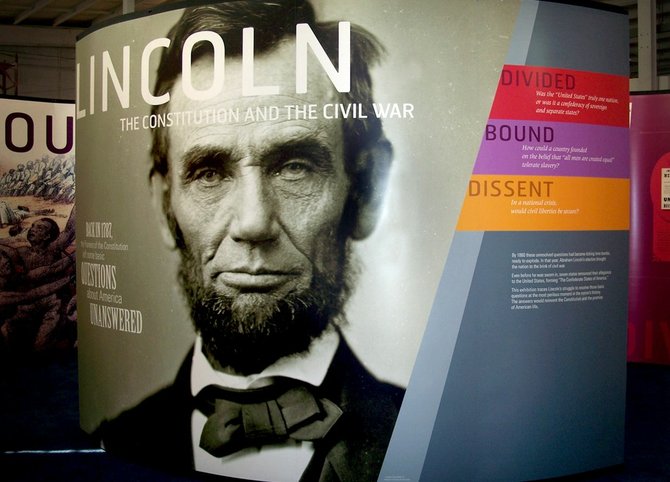The Lincoln exhibit at Hinds Community College’s Raymond campus will have traveled to more than 40 states by 2015. Photo by Courtesy Alusiv Inc
How could a country founded on equality for all tolerate slavery? Should the United States be considered one nation or should it be a confederacy of sovereign and separate state? These are some of the questions Abraham Lincoln grappled with during his presidential term, a time that proved to be one of the most volatile and controversial periods of United States history. As we commemorate the 1863 Vicksburg campaign of the Civil War more than 150 years later, "Lincoln: The Constitution and the Civil War," an exhibit displaying at Hinds Community College's Raymond campus, examines the same questions.
Since 2009, the exhibit has traveled around the country—by 2015, it will have seen more than 50 locations, crisscrossing the country to more than 40 states. The 1,000-square-foot exhibit focuses on three main issues that Lincoln grappled with, and how he used and tested the Constitution to combat them.
The interactive display features large curved boards with each topic in large letters. Each section poses a question pertaining to the issue.
The first portion of the exhibit, "Divided," focuses on secession. It asks: "Was the 'United States' truly one nation, or was it a confederacy of sovereign and separate states?" The second portion, "Bound," focuses on the people in slavery and poses the question, "How could a country founded on the belief that 'all men are created equal' tolerate slavery?" The third focus, "Dissent," asks, "In a national crisis, would civil liberties be secure?" Visitors learn about that time period and see the influence Lincoln had on our current political world.
Apart from the serious issues of secession, slavery and the Constitution, viewers learn interesting facts about Abraham Lincoln. For example, Lincoln only grew his famous beard after he was elected president in 1860, and he often stored notes in his signature stovepipe hat.
The exhibit ends with Lincoln's Gettysburg Address. "Lincoln's presidency left a legacy of ideals for our nation to live up to—equality, freedom and democracy. The powerful words of Lincoln's Gettysburg Address sought to transmit these ideals into future generations," the exhibit says. Visitors are left with the question, "Have we as a nation been faithful to this legacy?"
The traveling Lincoln exhibit's visit to the Jackson area was in the making for more than a year. The National Constitution Center in Philadelphia and the American Library Association in Chicago organized the exhibit, and the National Endowment for the Humanities provided a grant to make the event possible.
In a press release, the American Library Association said they hope that "visitors will leave the exhibition with a more complete understanding of Abraham Lincoln as president and the Civil War as the nation's gravest constitutional crisis."
The exhibit opened Aug.12 and ends Sept. 20. For more information visit hindscc.edu, ala.org or call 601-857-3380.



Comments
Use the comment form below to begin a discussion about this content.
comments powered by Disqus